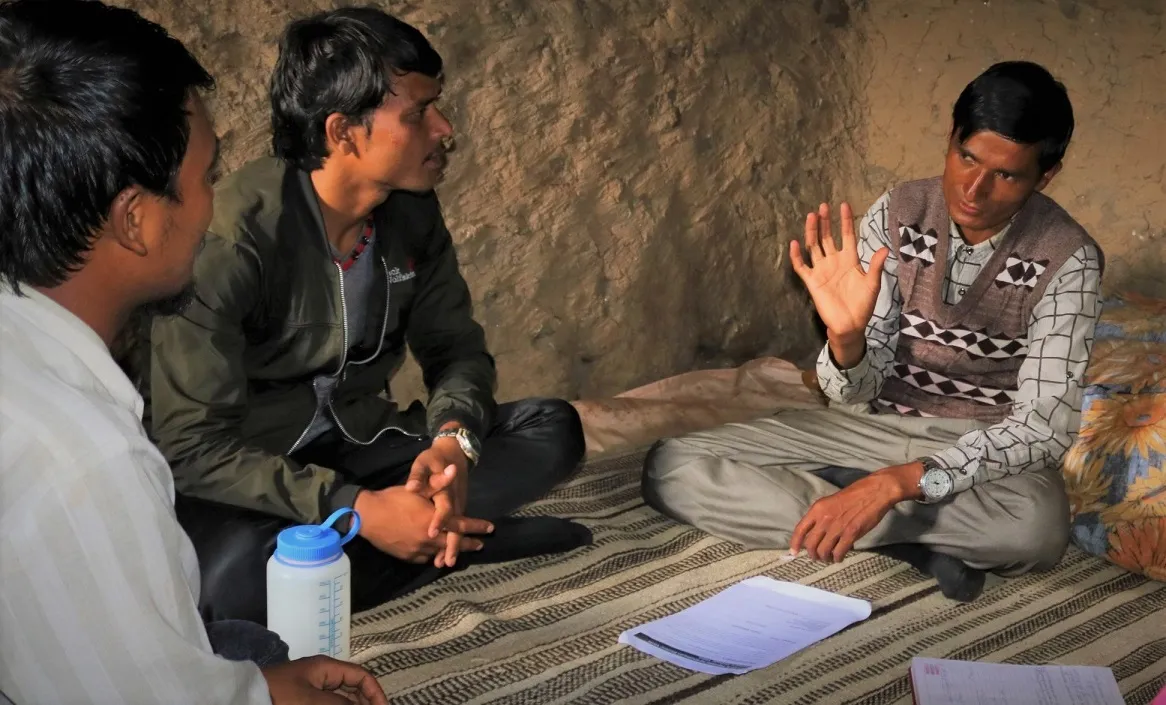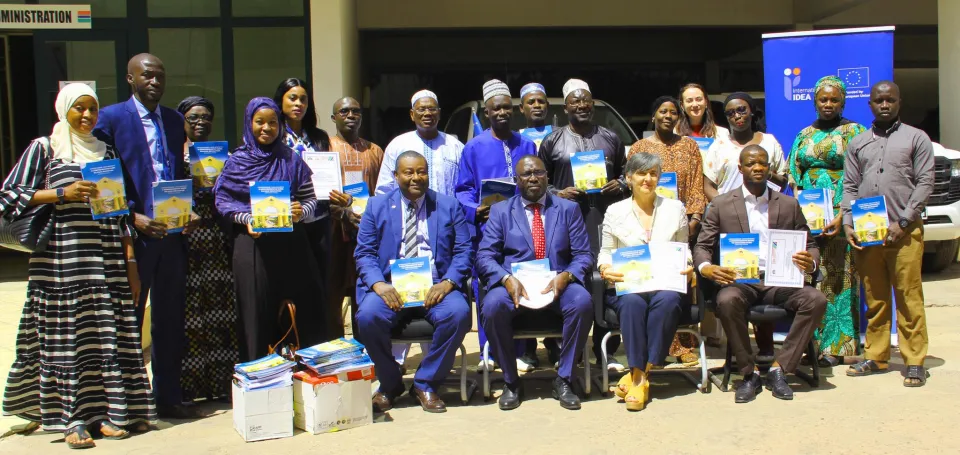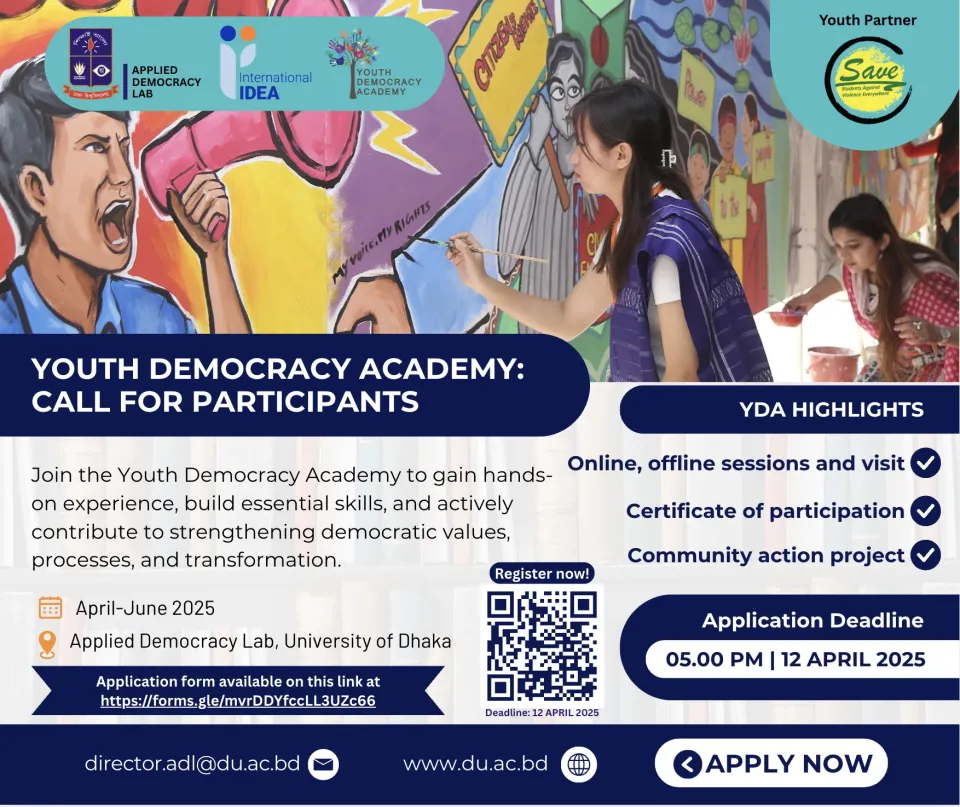Everything is political: How supporting local governments helped Nepal’s youth see politics differently

Bidi Yolkey Rai, 28, struggles to conduct an online session on the importance of local government committees that deal with Covid-19, the climate impact on agriculture, or road construction. “मलाई सुनि राख्नु भएको छ?” (“Can you hear me?”) She asks from time to time.
The internet in this remote part of Rolpa district is erratic, and the faces of local government officials freeze often on her laptop monitor. Her work is to mentor members of local municipalities to better understand problems, plan solutions and implement them through a deliberative decision-making process.
After Nepal’s local governments were elected in the 2017 federal elections, many municipal council members were unsure of their responsibilities, mandates, and decision-making roles. Rai’s job is to support them in local governance.
Till a month ago, Rai would pack some snacks and a bottle of water in her backpack, put on hiking shoes and be off to visit another distant ward in roadless Rolpa to meet the local representatives. However, as the second wave of the Covid-19 pandemic moved up to the mountains it changed everything.
Why are we not treated equally?
Bidi Yolkey Rai is one of the many local government mentors who had to return home after the pandemic hit the country in late April, and she now conducts her meetings online—bandwidth permitting.
She is part of the ‘Coherence’ programme that supports elected members of Nepal’s municipalities and wards to strengthen their planning and decision-making capabilities. Politics is all very new in this rugged and isolated district that was the cradle of the Maoist armed struggle in 1996.
Rai herself saw the decade-long conflict up close as a child. Almost every day, the insurgents would appear at their home and her parents would have to feed them without asking any questions.
One day while on her way to school, she was caught in the crossfire between the guerrillas and the security forces. Witnessing violence up close, she was convinced politics was a dirty game and all about killing people, and she was never going to be a part of it. Nineteen years later, she still cannot walk the path where the skirmish took place.
Yet, after the conflict ended in 2006 and her father joined the movement for the inclusion of indigenous rights in the Constitution, Rai began to slowly change her opinion about politics—it could be a vehicle for peaceful societal reform. She respected her father, and it all started making sense to her.
“I started thinking maybe politics was not such a bad thing, after all,” Rai recalls. “If all of us are humans, why were we not treated equally?”
At an age when her teenage friends were out having fun, Rai found herself taking part in conversations about identity politics. She moved to Kathmandu to go to college, but there she got a rude shock. Her classmates made fun of her for talking about political rights and inclusion. To be accepted by her peers, she had to cut herself off any talk of politics and gossip about fashion and celebrities like her friends.
But after volunteering for Teach for Nepal, Rai found her true calling in life, and although the idea of mentoring politicians twice her age was intimidating at first, she has been more than up to the challenge.
Nara Sunar, 29, is also a mentor with the Coherence programme, and had to flee his home village in Humla at age 13 when the Maoists demanded that every household had to contribute one fighter for the revolution. It took him six days to walk to a road head to get a bus to the border, and he worked in India for a few years.
At the end of the conflict he landed up in Kathmandu to continue his studies with the help of a child rights organization. Like Bidi Rai, he was also turned off by politics and thought it was “full of fake speeches and hollow promises” because every time he went back to his village in Humla, the reality struck him that nothing had changed.
“My friends who fought the war were behaving exactly like they did before. It was as if politics was all about using us people for the benefit of a few to get to power,” Sunar.
When Indra Nath Mishra, 26, returned to his village after graduating in mechanical engineering from India, schools were closed, there were protests across the Madhes and people roamed around with guns.
“Politics for me meant fear, I saw it as something that only brought trouble,” Mishra recalls. It was only after he joined a government college in Kathmandu that was steeped in debate about the new constitution that he began to reconsider his earlier perception about politics. He found the issues raised by the Madhes-based parties agreeable, but not without questions.
Chiranjivi Pandey, 29, did not hate politics as such, but his perception of political issues of the day were rather shaped by teashop discussions or newspaper headlines. He believed that politics itself was not bad, it was the politicians that were the problem who were giving politics a bad name.
With the promulgation of the new Constitution in 2015 that replaced Nepal’s unitary and centralised state structure with a federal system of governance, the ‘system’ formally changed. The first elections under the federal constitution in 2017 reinstated political representatives at the local levels for the first time after 20 years of being ruled by civil servants appointed by Kathmandu.
The new Constitution promised the ‘elimination of all forms of discrimination’ and the formation of ‘an egalitarian society’ based on the principles of proportional inclusion. The Constitution promised hope through the devolution of political decision-making and inclusion.

The youth are free of baggage of the past
Seizing the opportunity, the intergovernmental International IDEA in partnership with Nepal’s Ministry of Federal Affairs and UK’s General Administration and Foreign, Commonwealth and Development Office (then DFID) designed a programme to support the newly-elected local governments.
In 2018, it had its first batch of mentors ready to pilot the approach in Humla. However, it was not an easy decision to make because the perception was that federalism was such a complex issue that only ‘experts’ could explain it to local governments.
Budhi Karki of International IDEA, who proposed the idea of young mentors recalls: “We were clear that supporting local governments means supporting the federal system, and that would bring devolution. You cannot support change with the same old way of thinking and working. If we had used experts, they would have needed to unlearn what they had been doing with local bodies in the past. With fresh youth, we were free from that baggage, they had a learning attitude and they were ready to work in any place with extreme conditions.”
Under the programme, the mentors were selected and went through a month-long induction designed to prepare the mentors about the basics of Nepal’s federal system, structure, and processes of local governance, and most importantly, the attitude and approach needed for the new way of support.
Since 2018, International IDEA has mobilised almost 50 mentors, some in partnership with Kathmandu University and Nitishala Nepal who have served in 15 local governments in Karnali, Lumbini Provinces, and Province 2.
As a mentor Bidi Rai immediately came face to face with the powerful idea of letting local people decide local issues. “When I was younger I used to wonder why Kathmandu made all the decisions about our community without knowing anything about local problems. The elected local leaders I interacted with knew everyone in their village, and this forced them to be more accountable to people,” she says.
Is he really a people’s leader if he rides a horse to meetings?
Chiranjivi Pandey was also struck that decentralisation of government was beginning to allow people to channel their grievances. One day, he heard someone say at a municipality training in Karnali Province: “Is he really a people’s leader if he rides a horse to meetings?” It showed to him that federalism had empowered local people to speak up.
“Suddenly, they could stop the representatives they elected anywhere and anytime to vent their problems,” he adds.
Contrary to his experience in Karnali, Chiranjivi found less political awareness amongst the people as well as local representatives in Madhes. His colleague Indra Nath Mishra, who has experience working in both the mountains and plains, has an explanation for this.
He says, “The mountains have geographical complexities which are not man-made, they are of a topographical nature. The problems in Madhes are man-made. Important leadership positions in local governments are held by old-generation leaders who are still in the Panchayat era. They do politics for their own political or economic gain, they don’t care for us, they don’t fear us.”
He adds that the problems do not end there. Many elected representatives, such as ward council members lack a basic understanding of their roles and responsibilities under federalism. They are the ones whose decision-making capacity and accountability have to be enhanced. But the trainings are conducted by so called ‘senior’ (and mostly retired) experts who are rigid in their ways, and lack the empathy to support the devolution process.
“We stayed in a few trainings they delivered, and I observed a disrespectful attitude towards the locally elected representatives,” says Pandey. “They think local politicians don’t know anything. The PowerPoint slides provide fragmented information, and they often miss the bigger picture. There is no follow-up, it’s like a one-time job for them. Unfortunately, the government and development partners often go after them.”
After attending a few of these trainings in the mountains, mid-hills and Tarai, Pandey is convinced that it is in the Madhes where the capacity building through mentorship is needed the most.
He also feels that political parties have deceived the people by their choice of candidates for the reserved posts of historically excluded groups. “Even when more politically aware candidates from these groups were available, the ones chosen are often the silent, pliant individuals who do not question their authority. I wonder if this was a calculated move by the parties,” Pandey adds.
As a member of the Dalit community himself, Nara Sunar feels that there is still a long way to go, even within the federal system, towards meaningful inclusion in social and political spaces.
“The Dalit and women are there only because of the quota. Even then, a few influential ones have captured the power, and other representatives are silent observers. I have had Dalit representatives come to me asking to come along while presenting their plans in the meeting because they would not be heard if they were alone,” says Sunar, while admitting that it is because of the mandatory quotas that the dynamics of political space is more favourable to change than the social space.
“The biggest change is that the minorities are there and they know that they have equal rights and a share of the resources. The question in front of us now is how to support them and make the best use of those resources and it’s not easy,” Sunar adds.
Bidi Rai blames the lack of deliberation around the planning process for this anomaly. “There is no proper assessment of problems. The budget distribution, especially for the women and Dalit is considered as a checklist. How does a one-day pickle-making training or a celebration of women’s day serve to change the lives of women?” she asks.
Nothing is apolitical
Born to a privileged family in Kathmandu, Melissa Shrestha, 25, got her education abroad. Staying in Karnali, Melissa learnt the hardships of rural life, the basic day-to-day necessities they struggle to meet that she took for granted.
“My parents were opposed to me joining this programme till the last minute, but I wanted to get out of my bubble,” Shrestha says. “I used to post only pretty pictures on Facebook so that they did not force me to return. Coming here helped me examine my privileges and understand the dynamics of governance.”

As a youth, Indra Mishra was always saddened to see the state of his village: the roads would be ‘soil-topped’ only to be swept away by floods every year.
“I used to think that development was all about infrastructure. This programme made me realise that service delivery and social development are equally important, and so is the process through which we reach the decisions on development priorities. However technical the subject is, if it involves a political process, it is a political decision,” Mishra says, “That’s why nothing is apolitical. Politics is like the universal set of a Venn-diagram, and every other topic are the subsets of it.”
Working closely with local representatives, listening to their personal stories of struggle and success, their frustrations and satisfaction have given Mishra and his fellow mentors of the Coherence programme an insider look into local politics. They are not just mere observers of the system anymore.
It has given them a deeper understanding of the political process, the knowledge of ground realities, and most of all an attitude not to take things at face value. Some are taking the knowledge and perspectives they gained as mentors beyond their jobs to support their own municipalities during the Covid-19 crisis—transforming them to become more responsible and conscious citizens.
Despite the gloom and doom of the political paralysis in Kathmandu, the mentorship programme brings a glimmer of hope that political decentralisation is the way forward for Nepal. There is also the realisation that a new generation of young Nepalis have the energy and optimism about the future to bring about the changes from the grassroots up.
They strive to break the glass ceiling while at the same time diving deep to see things holistically. This is a generation that vows to correct the injustices of the past, and that believes as much in the process as in the final goal.
However, these young mentors are also proof that there has been so little investment to channel the energy, motivation and commitment of Nepal’s youths. They are considered nothing but stepping stones by the political parties for their own partisan gain, and they are not trusted enough to participate as the agents of change.
Just like many of the Coherence programme mentors themselves believed before they joined up, there are many young people in Nepal who abhor politics because they think it is a dirty game, they avoid following the news and blame politicians for everything that is wrong with the country. This programme has shown that it is possible to change that, and to engage the youth and turn them into agents of political reform.

If not us, who?
Phanindra Adhikary leads the Coherence programme at International IDEA and screens applications for the post of mentors, and admits that it is disheartening to see these youths with big degrees not having the basic knowledge of what is happening in the country.
“Maybe this is why a programme like this is more relevant than ever,” says Adhikari, who himself was in the last batch of the National Development Service volunteer programme in the 1970s after finishing college.
“For us at that time, the learning was limited as we were just volunteer teachers. But it was also thrilling and it helped me to widen my worldview,” he says. “What the youth have here is a lot more than that—it is a direct engagement to influence governments at the grassroots.”
Indra Mishra, who had thought of running for local elections in 2017 has not ruled out the possibility in the next polls.
Being one of only two people with a master’s degree in his village, Nara Sunar is skeptical that people would vote a Dalit as a municipality chair, but he is not giving up yet.
Bidi Rai says the programme has helped her realise that she has a key role in the process of change. She says, “If not us, who?”
This Feature Story was originally published by: NEPALI Times on 5 June 2021.



